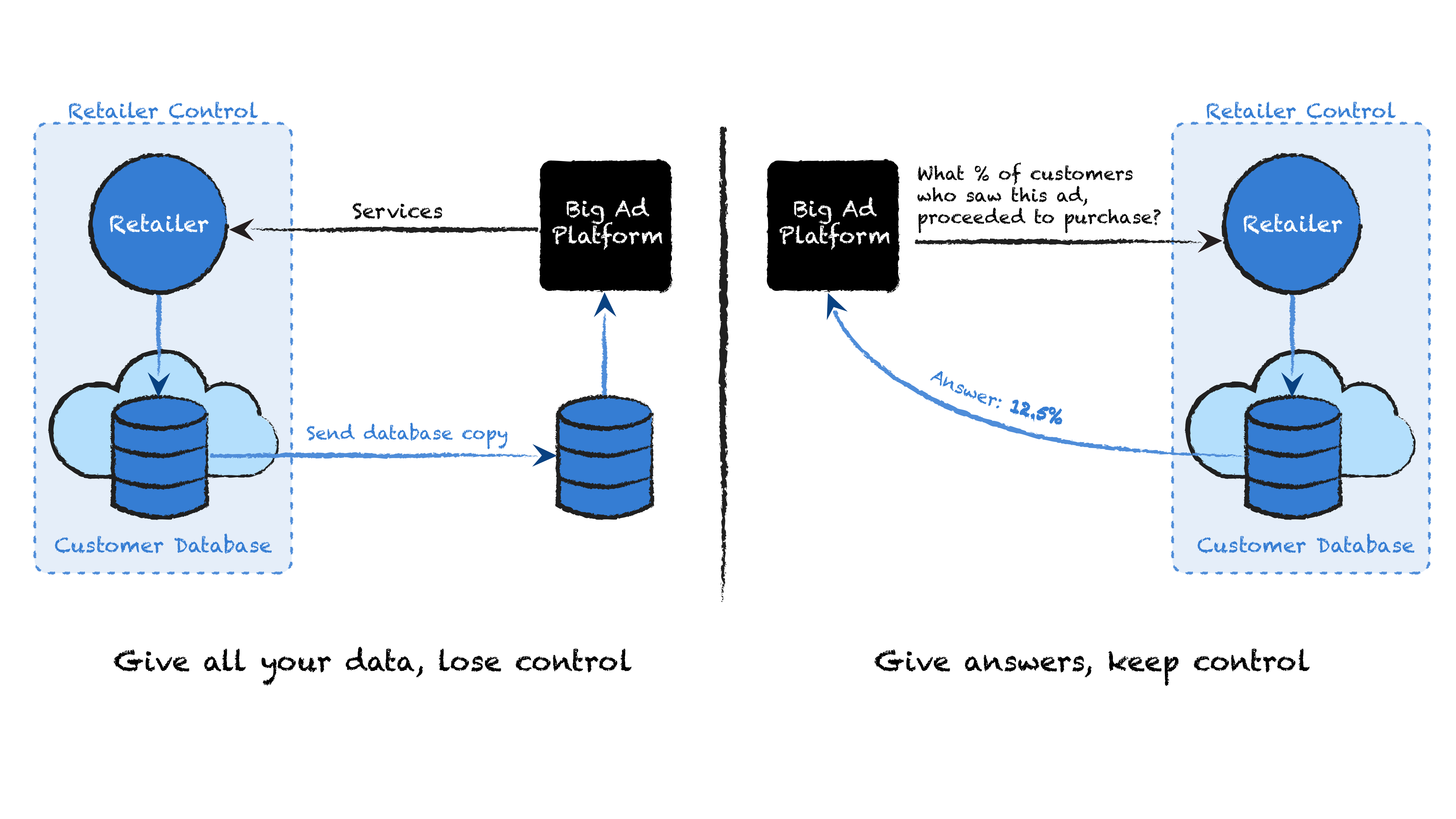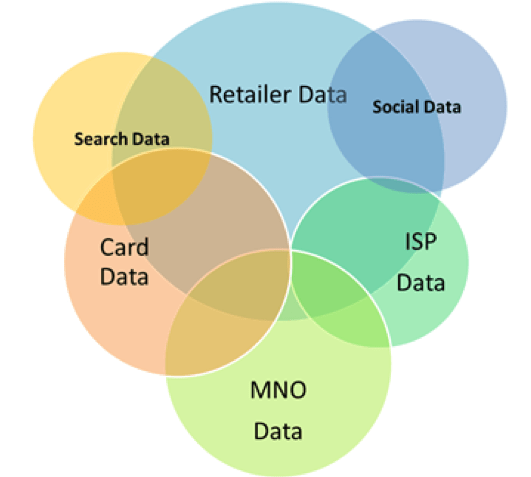Retailers cannot compete with the size of Google, Facebook or Amazon’s first party databases. And that’s ok. Retailers can still generate tremendous value and growth with their CRM and CDP files through smart connections to other trusted partners. The value of data is at the intersection: your data plus someone else’s. For example, retailers know what items are purchased, but not who purchased them. Banks know who made a purchase, but not what items were purchased. The intersection ties consumers to items to stores.
Traditionally there were 3 ways to manage the intersections: 1) Give all your data to a walled garden, 2) have them give all their data to you, or 3) leverage an independent party. In all 3 of these options someone loses control and “trust” must come in.
To solve these control and trust issues for first party data owners, Commerce Signals was purpose built to handle these intersections in a completely unique way: Federated Data®. In this model everyone keeps their data in their 4 walls, and intersections are managed as distributed queries.
For example, while Cambridge Analytica brought about changes to 3rd party data sharing, the entire ad industry has DRAMATICALLY increased direct first party data sharing. In other words, many large retailers are sending their real time SKU level purchase data (for all customers) directly into the big ad platforms. Beyond the tremendous reputational risks of exchanging data without a consumer’s consent, there is an even larger commercial risk. A retailer’s greatest asset is customer insight, you send the raw data to Google and Facebook it will certainly help them optimize, but it will also help them gain insight into consumer preferences, enabling them to model consumers. Continuing to operate this way helps the walled gardens get ever stronger.
Rather than giving out raw data, why wouldn’t you want to hold onto it within your own facilities. For example, if Google wanted to know “What % of customers who saw this ad, proceeded to purchase?”, a retailer (within our Federated Data market) could provide an answer based on aggregated data in near-real time. This would protect consumer information, and allow the retailer to operate within the constraints of their permissions.

Respecting consumer privacy, controlling data use and protecting consumer trust have been the key stumbling block for unlocking unique data sources such as banks and mobile operators. Laws regarding data sharing and privacy have long been in place for these regulated entities. They must control use and manage within the 3 basic rules of data:
- Right to have the data
- Right to use the data
- Right to share the data
Federated data allows each party to understand both WHO is asking the question and HOW it will be used. The value of data (and its availability) is based upon HOW IT IS USED. For example, the fact that I just researched a vacation to Italy is worth something to a seller of Italy guidebooks and much larger amount to a seller of Italy vacation packages. Commerce Signals enables controlled sharing of data and allows both parties to understand the value unlocked (i.e. pricing function).
My goal in designing our Federated Data® exchange is to allow parties to operate within a trust network. While blockchain provides an immutable chain of traceability across anonymous parties, a trust network provides for control of use and pricing between trusted parties. The internet is moving in this direction, away from massive aggregation and anonymity to communities and trust. The best example is in Tim Berners-Lee new project, underway at his MIT lab, called Solid (“social linked data”), a way for you to control your data while making it available to the applications that you want to be able to use it. Federated Data allows data to reside within the facilities (and control) of the owner, we provide the access mechanics and standard agreements to allow access. This control unlocks new data sets, which in turn increases the number of intersections. We refuse to hold data, to ensure we operate as a neutral party to manage privacy centric collaboration that withstands the scrutiny of both consumers and regulators.
Today Commerce Signals is fortunate to work with some of the world’s largest payment data acquirers. Why acquirers? Because they see all non-cash transactions and work exclusively for the benefit of the merchants they serve. Acquirers are also the only entity in payments with 2 critical pieces of information: transaction ID and Store ID. The transaction ID is key to tying SKU level information from the retailer to purchase and consumer information at the bank. The Store ID allows for assessment of store level performance and store level changes.
We protect consumer privacy through aggregated queries. Very few entities have consumer permission to share individual consumer data. Privacy regulations will tighten those restrictions further still. Immediate access to purchase information within distributed aggregate queries allows powerful intersections.
Example: 5 million consumers were exposed to a Walmart campaign. What was the aggregate spend of this group before, during and after the advertising? How did spending change among consumers who didn’t see the ad during these same periods (control group)?
Commerce signals has exclusively unlocked the largest set of consumer purchase information for the benefit of the retailers. This data is here today, there is no set up cost, no long planning cycle. We can run the first query for new merchants in under two weeks. In this way we help merchants make better decisions, and we help acquirers deliver value beyond the payment transaction.
Let’s discuss how we can help you improve your business, using the data and insights with your existing payment partners.

